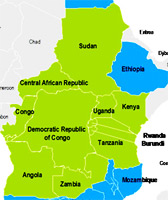UNESCO commissions media assessment for the Great Lakes region
23-09-2009 (Nairobi)

The recommendations from a 2008 Regional Conference on Media in the Great Lakes region, jointly organized in Kigali by UNESCO, the International Conference on the Great Lakes Region (ICGLR) and the International Media Support (IMS), have resulted in plans for media assessments in 11 African countries. These assessments will look into a multitude of needs, including media training, conflict sensitive reporting and building a sustainable media landscape.
Commenting on the Kigali Conference, Liberata Mulamula, Executive Secretary of ICGLR, said: “Even though the overall situation in the Great Lakes region is getting better, more work needs to be done in order to assure peace consolidation on different levels, especially in the area of capacity building, in both conflict reporting and election coverage.”
UNESCO is now working on these assessments, which are expected to facilitate the creation of a media network on peace and reconciliation. It also aims to draw up a regional media capacity building strategy for which additional resources will be mobilised in close collaboration with the ICGLR Secretariat. Particular focus will be put on conflict sensitive reporting, election coverage, harmonization of media regulation, and professional standards and codes of ethics that may enable media professionals report freely and safely.
Field-level studies in selected countries and a desk research covering 11 countries have been launched this month under the supervision of UNESCO’s Office in Nairobi. Existing regional media structures will be taken into account to promote and monitor press freedom, and to develop joint activities aimed at regulating and promoting media through professional training. This includes relevant pacts and protocols, such as the December 2006 Protocol on Management of Information and Communication in the Great Lakes region and its proposal to establish an independent Regional Council of Information and Communication (RICC).
The countries belonging to the Great Lakes region are the following: Angola, Burundi, Central African Republic, Democratic Republic of Congo, Republic of Congo, Kenya, Rwanda, Sudan, Tanzania, Uganda, and Zambia.
UNESCO is now working on these assessments, which are expected to facilitate the creation of a media network on peace and reconciliation. It also aims to draw up a regional media capacity building strategy for which additional resources will be mobilised in close collaboration with the ICGLR Secretariat. Particular focus will be put on conflict sensitive reporting, election coverage, harmonization of media regulation, and professional standards and codes of ethics that may enable media professionals report freely and safely.
Field-level studies in selected countries and a desk research covering 11 countries have been launched this month under the supervision of UNESCO’s Office in Nairobi. Existing regional media structures will be taken into account to promote and monitor press freedom, and to develop joint activities aimed at regulating and promoting media through professional training. This includes relevant pacts and protocols, such as the December 2006 Protocol on Management of Information and Communication in the Great Lakes region and its proposal to establish an independent Regional Council of Information and Communication (RICC).
The countries belonging to the Great Lakes region are the following: Angola, Burundi, Central African Republic, Democratic Republic of Congo, Republic of Congo, Kenya, Rwanda, Sudan, Tanzania, Uganda, and Zambia.
Related themes/countries
· Angola
· Burundi
· Central African Republic
· Congo
· Democratic Republic of the Congo
· Kenya
· United Republic of Tanzania
· Rwanda
· Zambia
· Uganda
· Training of Media Professionals
· Media in Conflict and Post-Conflict Situations
· Sudan
Share this story:
Contact information
- UNESCO
Source














